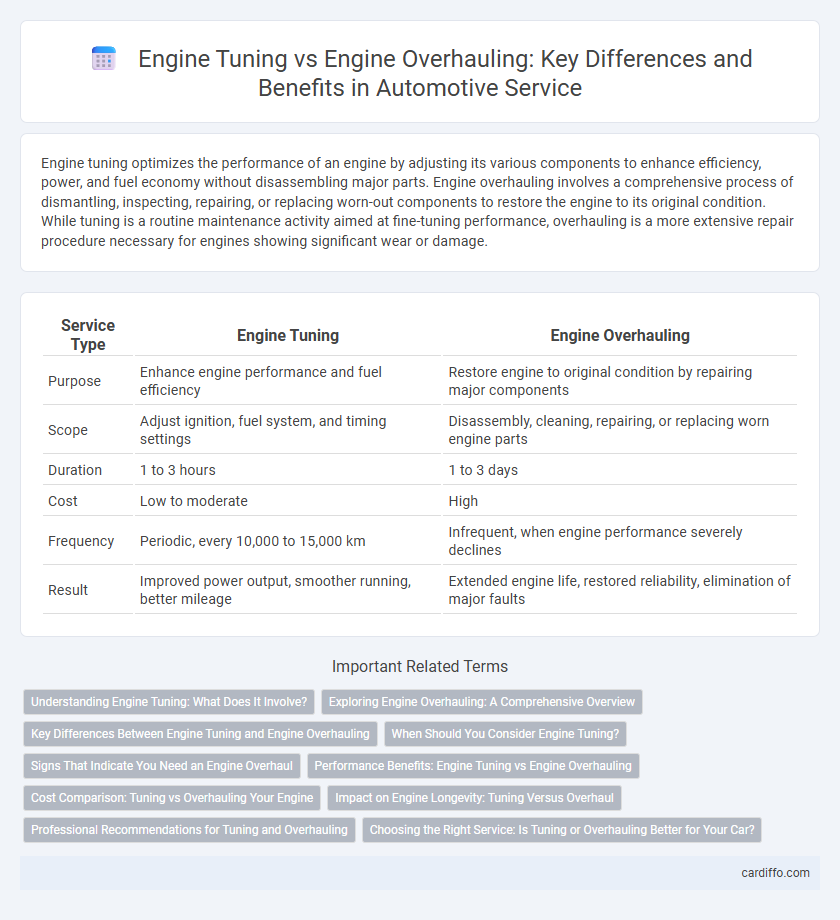Engine tuning optimizes the performance of an engine by adjusting its various components to enhance efficiency, power, and fuel economy without disassembling major parts. Engine overhauling involves a comprehensive process of dismantling, inspecting, repairing, or replacing worn-out components to restore the engine to its original condition. While tuning is a routine maintenance activity aimed at fine-tuning performance, overhauling is a more extensive repair procedure necessary for engines showing significant wear or damage.
Table of Comparison
| Service Type | Engine Tuning | Engine Overhauling |
|---|---|---|
| Purpose | Enhance engine performance and fuel efficiency | Restore engine to original condition by repairing major components |
| Scope | Adjust ignition, fuel system, and timing settings | Disassembly, cleaning, repairing, or replacing worn engine parts |
| Duration | 1 to 3 hours | 1 to 3 days |
| Cost | Low to moderate | High |
| Frequency | Periodic, every 10,000 to 15,000 km | Infrequent, when engine performance severely declines |
| Result | Improved power output, smoother running, better mileage | Extended engine life, restored reliability, elimination of major faults |
Understanding Engine Tuning: What Does It Involve?
Engine tuning involves adjusting the engine's parameters to enhance performance, fuel efficiency, and emissions control without replacing major components. It includes optimizing ignition timing, air-fuel mixture, and throttle response using diagnostic tools and software for precise calibration. Unlike engine overhauling, tuning targets fine-tuning existing engine systems to maintain smooth operation and prolong engine life.
Exploring Engine Overhauling: A Comprehensive Overview
Engine overhauling involves a complete disassembly, inspection, and refurbishment of engine components to restore optimal performance and extend engine lifespan, compared to engine tuning which primarily adjusts engine parameters for improved efficiency and power output. Overhauling addresses deep mechanical issues such as worn-out pistons, bearings, and valves, ensuring thorough repairs beyond the scope of tuning processes. This comprehensive service is essential for engines with significant wear or damage, providing a foundational restoration rather than incremental performance enhancements.
Key Differences Between Engine Tuning and Engine Overhauling
Engine tuning involves adjusting the engine's parameters such as fuel injection, ignition timing, and air-fuel mixture to enhance performance and fuel efficiency without disassembling major components. Engine overhauling requires a comprehensive teardown, inspection, and replacement of worn-out parts like pistons, valves, and bearings to restore the engine to its original condition or extend its lifespan. While tuning focuses on optimization and performance improvement, overhauling is a restorative process addressing mechanical wear and damage.
When Should You Consider Engine Tuning?
Engine tuning is ideal when your vehicle exhibits reduced fuel efficiency, sluggish acceleration, or inconsistent idling, as it adjusts parameters like air-fuel mixture and ignition timing for optimal performance. It is a preventive maintenance measure aimed at enhancing engine responsiveness and extending its lifespan without the extensive cost of engine overhauling. Consider engine tuning every 20,000 to 30,000 miles or when routine diagnostic checks indicate minor performance issues not related to major mechanical failures.
Signs That Indicate You Need an Engine Overhaul
Persistent knocking noises, excessive smoke from the exhaust, and a significant drop in engine performance are key signs indicating the need for an engine overhaul. Engine tuning primarily addresses minor adjustments and performance optimization, whereas an overhaul involves comprehensive disassembly, inspection, and replacement of worn components. Frequent oil consumption, low compression readings, and metal particles in the oil further confirm the necessity for a full engine overhaul.
Performance Benefits: Engine Tuning vs Engine Overhauling
Engine tuning enhances vehicle performance by optimizing fuel consumption, ignition timing, and air-fuel mixture for increased horsepower and torque. Engine overhauling restores engine components to factory specifications, resolving wear and tear to improve reliability and extend engine lifespan. While tuning boosts immediate power and efficiency, overhauling ensures long-term engine health and consistent performance.
Cost Comparison: Tuning vs Overhauling Your Engine
Engine tuning typically costs between $100 and $500, offering a cost-effective way to improve performance by adjusting fuel injection, ignition timing, and air-fuel mixture. Engine overhauling, on the other hand, can range from $1,000 to $4,000 or more, involving extensive repairs or replacement of critical engine components such as pistons, valves, and bearings. Choosing tuning over overhauling depends on the engine's condition, with tuning being a budget-friendly option for maintenance and minor performance enhancements, while overhauling is necessary for serious wear or damage.
Impact on Engine Longevity: Tuning Versus Overhaul
Engine tuning optimizes performance by adjusting fuel injection, ignition timing, and air intake, enhancing efficiency without extensive wear impact. In contrast, engine overhauling involves dismantling and replacing worn components like pistons, bearings, and gaskets, directly restoring engine longevity and reliability. Regular tuning prolongs engine life by maintaining optimal function, while periodic overhauls address accumulated mechanical wear to ensure sustained durability.
Professional Recommendations for Tuning and Overhauling
Professional recommendations for engine tuning emphasize precise calibration of fuel injection, ignition timing, and air-fuel mixture to enhance performance and fuel efficiency without compromising engine longevity. Engine overhauling involves a comprehensive dismantling process to inspect, repair, or replace worn components such as pistons, cylinders, and valves, restoring engine functionality and preventing major failures. Experts advise regular tuning to maintain optimal engine operation, while overhauling is necessary only after significant wear or damage is detected through diagnostics and performance analysis.
Choosing the Right Service: Is Tuning or Overhauling Better for Your Car?
Engine tuning enhances your car's performance by optimizing fuel efficiency, ignition timing, and air-fuel mixture, ideal for maintaining power and smooth operation. Engine overhauling involves a comprehensive rebuild of engine components, repairing wear and damage, and is necessary when your engine shows significant performance decline or mechanical failures. Choosing between tuning and overhauling depends on your vehicle's condition and service history, with tuning suited for routine maintenance and overhauling reserved for extensive repairs to restore engine functionality.
Engine tuning vs Engine overhauling Infographic

 cardiffo.com
cardiffo.com